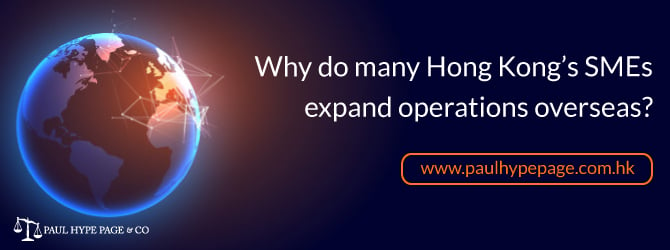As has been mentioned, China has the largest population in the world. Therefore, there is a massive consumer market of which many a company owner could take full advantage. The economy of China is also growing rapidly. It is today the world’s second-largest economy. Some predict that it will soon surpass the United States as the world’s largest.
Many of Hong Kong’s business owners consider mainland China to be a primary growth market. Due to the large profits which might be gained through successful business operations in Hong Kong, many companies are inclined to expand there. Furthermore, there are close cultural and linguistic ties between Hong Kong and mainland China. This is especially true of the region of China known as the Pan-Pearl River Delta region.
Hong Kong is also a part of this region. The government of Hong Kong has formulated specific policies which facilitate business activities and collaboration involving both Hong Kong companies and mainland China companies in that region. Thus, through these policies, business and economic ties between mainland China and Hong Kong may be strengthened.
Mainland China and Hong Kong Closer Economic Partnership Agreement
The governments of mainland China and Hong Kong have signed the Mainland and Hong Kong Close Economic Partnership Agreement (CEPA). The CEPA was first signed in June 2003. This economic agreement has facilitated business exchanges between Hong Kong and mainland China in several different ways.
Among these methods are the following:
- Tariff reductions on certain goods exported by Hong Kong companies to mainland China
- Measures intended to facilitate bilateral exchanges of goods as well as people and capital
- Definitions of fields for cooperation between mainland China and Hong Kong as well as registration procedures and verification of certificates of origin
- Preferential opening of mainland China’s market to all Hong Kong-based service providers in 18 different sectors
The CEPA is similar to other trade agreements around the world about its structure and features. Both governments involved intend to continue using this agreement to benefit companies based in both Hong Kong and mainland China. As Hong Kong and China are separate members of the World Trade Organization (WTO), the CEPA thus conforms to the regulations set by the WTO.
Key Areas of Focus in the CEPA
The four areas prioritized by the CEPA are trade of goods, trade of services, investment, and economic & technical cooperation. The CEPA has made it so that all goods that leave Hong Kong for mainland China are not subject to the effects of any tariffs as long as the rules of origin are fulfilled. This has been the case since 2006. In 2018, the governments of China and Hong Kong signed the Agreement on Trade in Goods which served to reinforce the provisions stated in the CEPA.
The CEPA also facilitates the trade of services between Hong Kong and mainland China. This is because it provides preferential treatment to all suppliers of services in Hong Kong, expanding their business operations to mainland China. Among the examples of the preferential treatment include the following:
- Relaxed requirements on equity shareholding
- Relaxed restrictions linked to geographical location and business scope
- Permission for operations in China to be fully Hong Kong-owned
- Reduced registered capital requirements
Facilitating Trade of Services through Preferential Treatment
In 2017, the Agreement on Economic and Technical Cooperation was formed to update and reinforce the related activities which were specified in the CEPA. This agreement was also more able to cater to the needs of business owners in Hong Kong and mainland China alike. It also incorporated economic elements from China’s Belt and Road Initiative into the CEPA’s framework. In this way, businesses in Hong Kong would become more able to participate actively in business activities in China.
The CEPA has also been enhanced through the Investment Agreement. The Investment Agreement was signed by mainland China and Hong Kong in 2017. It served to expand market access commitments to non-service sectors in both locations. It also introduced specific obligations related to investment protection. Thus, investors have become more likely to invest in Hong Kong companies operating in mainland China. This has in turn made more Hong Kong companies expand their business operations to China; they are now more likely to receive income through external investments.
On that note, we at Paul Hype Page & Co. can serve anyone who would like to establish a company of their own in Hong Kong. Our incorporation team will guide you through each step of the process so that your company will be incorporated according to the details of the Companies Ordinance. Through our services, you can be certain that your Hong Kong company incorporation will be completed in an accurate and timely manner.
Why and How China Depends on Hong Kong Companies
Although many do not realize this fact, the government of China would very much like companies in Hong Kong to achieve much success. This is because Hong Kong is currently controlled by China and is therefore China’s primary financial and economic hub. Hong Kong is one of corporate China’s leading sources of capital. This is because Hong Kong is arguably the most economically and financially viable business location in the Asia-Pacific region. In this way, the success of Hong Kong companies also helps companies based in mainland China enjoy more success abroad. Therefore, the viability of Hong Kong companies may serve as a barometer for the viability of their counterparts in mainland China.
Companies in China also depend on their Hong Kong counterparts for funding. Many foreign investors have invested in Hong Kong-based companies. Most foreign direct investment in China comes through Hong Kong. Hong Kong has also consistently ranked as one of the world’s most suitable locations for the conducting of business activities. The companies of Hong Kong have been duly rewarded by investors because of this fact. Thus, the more investments enter Hong Kong, the more the business environment of China benefits.
During the eight years spanning 2010 to 2018, approximately 73% of initial public offerings which were made by companies based in mainland China were made in Hong Kong. Hong Kong also serves as the primary offshore hub for the sales of bonds by companies based in China. Furthermore, the Hong Kong Shanghai Stock Connect scheme has been used by many investors to gain access to stock markets in mainland China.
However, the most important reason why China would like Hong Kong’s companies to prosper is the fact that a severe downturn in business fortunes in Hong Kong would cause severe damage to China’s economy.
Regarding the economy of China as a whole, the following are some of the facts about Hong Kong:
- Approximately 9% of China’s GDP is held in the form of assets in Hong Kong banks
- Mainland China’s primary trade partner in services
- Has been a cornerstone of China’s attempts to spread the use of the Chinese yuan around the world
- China’s main market for equity and debt financing
- Over 58% of all non-financial outbound direct investment from mainland China goes to Hong Kong
- Large portions of investment from mainland China in Hong Kong companies return to mainland China
These facts serve as ample evidence that both Hong Kong and mainland China alike benefit through the successful business activities conducted between companies of the two areas. They should also encourage business owners in Hong Kong to expand business operations to mainland China whenever such is possible.
Conclusion
There are many advantages claimable by a Hong Kong company which expands its business operations to mainland China. These benefits apply to business owners in both locations. The CEPA as well as other policies formulated by both governments have also facilitated trade and business activities conducted between Hong Kong companies and mainland China companies. Most importantly, both the governments and economies of Hong Kong and China benefit through the conducting of business between companies based there.







